The IKI in 2023
For the International Climate Initiative (IKI), 2023 was a year with many milestones – from the 15th birthday of the funding programme to the publication of the ‘IKI Strategy up to 2030’. Here is an overview of the most important topics during the last year.
Table of contents
- The IKI turns 15
- The IKI strategy up to 2030
- Global targets
- Climate Club initiative for global decarbonisation
- JETPs in Indonesia, South Africa and Viet Nam
- Bilateral climate and energy partnerships of the Federal Government with Brazil, Colombia and Peru
- 2023 NDC Conference
- Climate Finance Programme Türkiye
- Support for the green recovery in Ukraine
- Successful transformation of the energy sector in Chile
- Support for especially vulnerable small island states
- Ecosystem-based adaptation
- Clean and secure energy for displaced people
- Implementing the Global Biodiversity Framework
- Restoration of forest ecosystems and forest landscapes
- Sustainable land use
The IKI turns 15
The year 2023 was one to celebrate for the IKI, as the funding programme – which makes an important contribution to the international climate finance commitments of the German Federal Government – turned 15 this year. The facts and figures for the programme at the start of the anniversary year were certainly something to be proud of. Since its formation, the IKI has financed more than 950 projects for climate change mitigation and biodiversity, plus activities in over 150 developing and emerging countries, with a funding volume of almost EUR 6 billion (by the end of 2022). The initiative therefore rightfully celebrated its 15th anniversary with several events during the course of 2023, under the general title of ‘Committed to the planet and the people’.
Take a look back at 15 successful years of the International Climate Initiative and the events held in the anniversary year

The IKI strategy up to 2030
Alongside this major milestone in the IKI’s history, the IKI published another building block towards a successful future in the autumn of 2023: the ‘IKI Strategy up to 2030’. Published jointly by the Federal Ministry for Economic Affairs and Climate Action (BMWK), the Federal Environment Ministry (BMUV) and the Federal Foreign Office (AA), this strategy sets out how they intend to maximise their contributions to tackling the global climate and biodiversity crisis in partner countries until the end of this ‘Decade of Implementation’.
For the IKI, the strategy defines its primary objective as helping to achieve a climate-neutral economic approach that is resilient to the impacts of climate change and which embeds itself in the natural cycles of healthy ecosystems. This is why the IKI will be focusing its work more strongly on sectoral transformation in the future. IKI projects in the partner countries are therefore working on reducing subsidies that harm the climate in certain sectors, for example, or optimising the requirements for the integration of renewable energy sources into power grids.
To this end, the three ministries have specified prioritised action areas within the four funding areas to achieve the maximum impact. Over the next few years, the focus is on the financing of the socioecological transformation, and on the sustainable and climate-compatible development of urban spaces. The IKI has also set itself some specific goals to be achieved by 2030. These are in the following areas:
- Raising ambition
- Improving the enabling environment
- Implementation of measures for climate change mitigation, biodiversity and/or climate change adaptation measures through piloting and scaling-up
- Leveraging private funds
To achieve their strategic goals, the three ministries are utilising a mix of mutually complementary funding instruments and a broad-based structure of implementing organisations in the funded projects.
Find out more here about the specific focal points and goals in the ‘IKI Strategy up to 2030’

With the International Climate Initiative, we are pooling the expertise of three ministries of the German Federal government in order to support socio-ecological transformation processes in emerging and developing countries, for example in the energy sector or in the field of industrial decarbonisation. With the “IKI Strategy 2030”, we give a clear signal that we will consistently continue along this path at an international level, too.

The International Climate Initiative is Germany's driving force for global cooperation in climate action and nature conservation. The IKI links climate protection with the fight against the extinction of species and strengthens the interaction between the two. This is precisely where the "IKI Strategy 2030" focuses its funding activities, creating synergies between several fields of action. This allows the IKI to make even better use of these strengths.

This decade is crucial for the success of global climate action. What we do or do not do today will have an impact for thousands of years to come. This is why it is so important that we change course in global climate policy. With the "IKI Strategy 2030", we have made the International Climate Initiative fit for the challenges of the upcoming years.
IKI contributes to global targets agreed at COP28
The IKI’s 2030 strategy focuses more strongly on the global energy transition as one of the prioritised action fields in the ‘Mitigation of greenhouse gas emissions’ funding area and is therefore acting in support of international agreements. The 28th UN Climate Change Conference of the Parties in Dubai (COP28) secured an agreement on a general fossil fuel exit as well as joint specific energy transition targets (global targets): a tripling of renewable capacities and a doubling of energy efficiency by 2030.
The IKI has supported both of these targets since its formation and will be continuing its commitments according to its strategy. Based on experience gained in Germany, the focus is on the ongoing development of energy transition technologies, their financing and their socially equitable design, with the goal of securing acceptance within general society for the necessary transformation.
Alongside the large-scale expansion of renewables and improvements to energy efficiency in order to reduce the demand for global capacity expansion, the IKI is therefore promoting the use of green hydrogen (including as energy storage), sector coupling, and low-emission cooling and heating. In the electricity sector, this will also involve meeting demand by expanding power grids, using intelligent demand-side management and deploying innovative storage technologies.
Since its formation, the IKI has therefore provided more than EUR 1.6 billion for the global energy transition, which has been used to fund over 300 projects as well as for participation in international initiatives. IKI projects are providing support to partner countries in implementing the energy transition and ensuring social fairness (a ‘just’ transition). Accordingly, the 2023 thematic call had four thematic priorities for promoting the global energy transition and energy efficiency. In the new funding call from the Mitigation Action Facility financed by the IKI, the topic of ‘Energy’ is also one of the three points of focus.
To organise cooperation in the field of energy based on the idea of efficient partnerships, the IKI also works in close consultation with other federal government instruments. Among others, these include the climate and energy partnerships, energy dialogues, Just Energy Transition Partnerships (JETPs), and projects that are financed exclusively by the Federal Ministry for Economic Cooperation and Development (BMZ).
Find out more about the IKI’s contribution to the global energy transition
Full details of the 2023 thematic call and IKI funding area ‘Mitigation of greenhouse gas emissions’
Climate Club initiative for global decarbonisation
In 2022, Chancellor Olaf Scholz used the occasion of the German G7 Presidency as an opportunity to form the open and cooperative Climate Club, with the aim of supporting the rapid and ambitious implementation of the Paris Agreement and accelerating climate change measures for emissions mitigation. As an inclusive forum of ambitious developed, transitioning and developing countries, the Climate Club is helping to speed up the decarbonisation of especially emissions-intensive industrial sectors. Now numbering 40 member states, the Climate Club also offers countries an opportunity to raise domestic issues at a high-ranking policymaking level, which can then be addressed by the IKI.
The Climate Club is based on three pillars:
- Advancing ambitious and transparent climate change mitigation policies
- Transforming industries
- Boosting international climate cooperation and partnerships
The aspects addressed by the third pillar, namely to encourage and facilitate climate action and improve the enabling environment for industrial decarbonisation in developing and emerging countries, form the central field of work for the IKI.
Although industrial decarbonisation is a decisive step towards the establishment of a successful climate-neutral economy, this approach is still in its infancy. For this reason, the Climate Club is concentrating first on the decarbonisation of core industrial processes, such as the production of low-emission basic materials like steel and cement. Close collaboration between international partners is supporting the creation of lead markets for these basic materials – by harmonising definitions and standards, for example. The message to industrial producers is clear: the business case for the future at an international level is the decarbonisation of large-scale manufacturing.
The IKI supports the decarbonisation of the manufacturing sector as one of the prioritised action areas within its strategy in relation to the mitigation of greenhouse gases, which is a recurring focus of the IKI’s calls. Within its new organisational structure, the IKI also benefits from the long-standing expertise of the BMWK in this thematic field.
Since early December 2023, the IKI has financed the Secretariat for the Climate Club’s Global Matchmaking Platform. The Secretariat coordinates the international portfolio of technical and financial support services for transitioning and developing countries with the aim of accelerating industrial decarbonisation. In this context, the IKI is also supporting UNIDO’s ‘Partnership for Net Zero Industry’ programme, which is helping developing and emerging countries to develop national transformation pathways, identify technology options and prepare pipelines for investment-ready projects.
Read more about the Climate Club
Read more about the Global Matchmaking Platform and the Partnership for Net Zero Industry
JETPs in Indonesia, South Africa and Viet Nam
An important point of focus for the IKI in the field of energy is its support for Just Energy Transition Partnerships (JETPs) in Indonesia, South Africa and Viet Nam. Several developed countries use the JETP format to support a chosen partner country and help it accelerate its just energy transition towards climate neutrality. As plurilateral climate and energy partnerships, JETPs constitute a central instrument within German foreign climate policy.
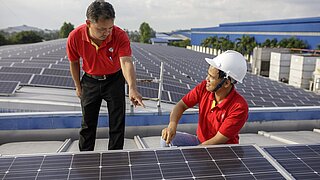
As one example, the JETP signed with South Africa aims to accelerate its coal exit while expanding renewable energy – both as part of a just energy transition. Overall, the country aims to cut greenhouse gas emissions by 1 to 1.5 billion tonnes over the next 20 years. The IKI is also contributing to the JETP South Africa. A key element of IKI’s funding here is for the ‘Just Transition to a Decarbonised Economy for South Africa (JUST SA)’ project.
Targets set for the JETP with Indonesia envisage reaching net zero emissions in the electricity sector by 2050. A key element of the IKI contribution to JETP Indonesia is the German start-up financing for the ‘Energy Transition Mechanism Partnership Trust Fund (ETMPTF)’. This aims to achieve earlier decommissioning dates for coal-fired power plants and faster replacement with clean electricity.
The aim of JETP Viet Nam is to support the partner country in achieving its net zero emission targets by 2050 and, in particular, to accelerate the just decarbonisation of its electricity sector. In the JETP, Viet Nam has also set itself the target of generating nearly 50 percent of its power from renewables by 2030.

IKI projects as part of JETP South Africa:
IKI projects as part of JETP Indonesia:
- Energy Transition Mechanism Partnership Trust Fund (ETMPTF)
- ExploRE - Strategic exploration of economic mitigation potentials through renewables
- Clean, Affordable and Secure Energy for Southeast Asia (CASE)
- Sustainable Energy Transition in Indonesia (SETI)
- Innovation Regions for a Just Energy Transition
IKI projects as part of JETP Viet Nam
Bilateral climate and energy partnerships of the Federal Government with Brazil, Colombia and Peru
Within the scope of climate and energy partnerships, Germany is working with many partner countries on topics from the fields of energy, climate and the economy. These action areas include the following:
- Expansion of renewable energy and its integration into the national energy system
- Improvements to energy efficiency
- Integration of multilateral climate instruments such as carbon pricing
- Managing the socioecological dimensions of the energy transition
Increasingly, the topic of energy security for Germany’s respective partner countries is also becoming a focus for cooperation.
Each of these partnerships is based on a letter of intent. The IKI’s work is also helping ensure the success of these partnerships.
German-Colombian partnership
In June 2023, Germany launched a bilateral partnership for the climate and a just energy transition with Colombia, with the aim of intensifying cooperation on climate change mitigation and mobilising additional financial resources. As well as the fields of renewable energy (in the context of a just energy transition) and climate change mitigation, this partnership also focuses on cooperation to protect and ensure the sustainable use of biodiversity as well as sustainable and resilient urban development. It is also designed to promote cooperation with the private sector, civil society and the research community, as well as lead to lasting peace in all of Colombia’s regions. The IKI interface project in Colombia and the Federal Ministry for Economic Cooperation and Development (BMZ) are supporting the various working groups within the partnership via a local Climate Secretariat. Global, regional and bilateral IKI projects are also making direct or indirect contributions to partnership goals.
Before the launch in 2024, the Colombian country call was prepared in 2023 with the thematic priorities:
- ‘Roll-out of renewable energies and economic diversification for a just coal phase-out’ and
- ‘Landscape-scale restoration as an economic and multifunctional nature-based solution for peace’.
IKI projects
German-Peruvian partnership
The climate partnership with Peru is helping the country to reduce emissions of the greenhouse gas CO₂. In the Amazonian rainforest, the primary focus is on protecting the forest – with efforts to counter forestry crime, for example, which is now also threatening indigenous communities. In 2023, the first high-level dialogue was hosted addressing the topic of mobility.
IKI projects
- Impact investments for the sustainable use of biodiversity in Peru
- Indigenous leadership for the restoration and sustainable use of biodiversity in the Andes
- Living Amazonian Landscapes: Co-management model among indigenous communities for the effective conservation, protection…
- Ecosystem-based adaptation measures for integrated coastal and marine zone management (EbAMAR)
- Participatory and Climate-Informed Decision Support Systems: Enhancing Water Resource Planning and Climate Action in…
- Protection and regeneration of the high Andean puna grassland and the tree line forest of the Manu Biosphere Reserve…
German-Brazilian partnership
One cornerstone of the new ‘Partnership for a just and ecological transformation’, as signed by German Chancellor Olaf Scholz and President Lula da Silva at the second German-Brazilian government consultations in December 2023, is an energy partnership. The energy partnership with Brazil aims to increase renewable energy and green hydrogen capacities while boosting energy efficiency through the implementation of several measures that also include high-level political dialogue. The IKI interface project liaises regularly with the energy partnership Secretariat on current topics and addresses the goals of the transformation partnership as part of its consulting work.
In 2023, the country call with Brazil was prepared. The thematic priorities of this call are
- ‘Decarbonisation of emission-intensive industrial sectors’,
- ‘Combating deforestation in the Brazilian biomes Cerrado, Caatinga, Pantanal, Atlantic Rainforest and Pampa’, and
- ‘Climate change adaptation in vulnerable urban territories: cooperating with communities and strengthening local governments’.
The IKI is also using its projects to support the sustainable transformation of the finance market and thereby harmonise financial flows with the goals of the Paris Agreement. As one example, the Inter-American Development Bank (IDB) is utilising the Fiscal Policy Fund supported by the IKI to advise clients such as the Brazilian Ministry of the Economy on developing and implementing a green fiscal and spending policy. The IKI is also supporting the LAC Green Finance Facility, which aims to mobilise private investment in climate action and sustainable business models via public development banks in the Latin America and the Caribbean region. To this end, the IKI is advising clients such as Brazilian development banks on how to develop tailor-made green financial products. There are plans to extend this IKI interface project from mid-2024.
IKI projects
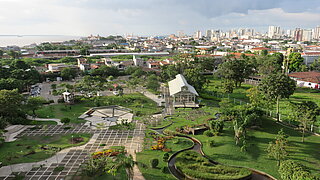
2023 NDC Conference: private climate finance is the key to success
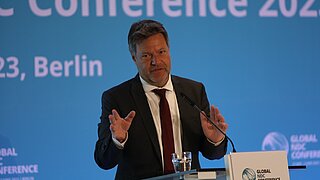
Nationally determined contributions (NDCs) form an important instrument for achieving the transformation. With these NDCs, individual countries set up climate action targets intended to accelerate progress towards emissions neutrality and therefore towards compliance with the goals of the Paris Agreement.
Since 2017, the Global NDC Conference financed by the IKI has developed into an international dialogue platform on the topic of NDCs. The 2023 Global NDC Conference was held in Berlin from 31 May to 2 June and was attended by 350 experts from more than 50 countries, who discussed their experiences in relation to policy harmonisation and ambition-raising as well as the mobilisation of the necessary financial resources. Key topics included the financing of climate change mitigation measures and private sector participation.
In conclusion, implementation and financing gaps must be closed to enable the ambitious implementation and further development of NDCs. This is dependent on the mobilisation of private climate finance, which in turn requires governments to work closely with the private sector. To support climate change mitigation, the private sector requires planning reliability, as well as clear cut-laws, regulations and incentives, and a transparent assessment of investment risks and opportunities. Initial investment and guarantees are also needed from the public sector. Last but not least, stable conditions are also important in relation to administrative procedures and taxation.
Read more about the results of the Global NDC Conference on the conference website
Climate finance programme started for Türkiye
IKI priority country Türkiye is one of the 15 biggest greenhouse gas emitters worldwide. At the same time, the country is strongly impacted by the climate crisis. In October 2021, Türkiye ratified the Paris Agreement and has set itself the goal of becoming climate-neutral by 2053. However, the country’s current nationally determined contribution does not adequately reflect this ambitious goal.
The funding priority focuses on measures for emissions avoidance and mitigation in the energy sector, in relation to both the expansion of renewable energy and energy efficiency. Within the context of a multilateral memorandum of understanding (MoU) on climate action signed in 2021, the German Federal Government agreed to provide an untied EUR 200 million line of credit for climate change mitigation measures. To ensure the funding of ambitious and innovative measures, the IKI is supplementing the loan with investment grants amounting to EUR 18 million, as well as training and consulting measures at Turkish KfW partner banks amounting to EUR 2 million.
Support for the green recovery in Ukraine
![[Translate to English:] Federal Minister for Economic Affairs and Climate Action Robert Habeck holds an IKI chart with another man. To the right stands a young man who is being interviewed.](/fileadmin/_processed_/a/7/csm_20230405_Ukraine_visit_Oleksandr_Popenko_d6ab939fa7.jpg)
The IKI has supported Ukraine as one of its priority countries since the Initiative’s formation in 2008. In light of the impact of the Russian war of aggression, the IKI is focusing its projects on meeting the most pressing demand: the country’s green recovery.
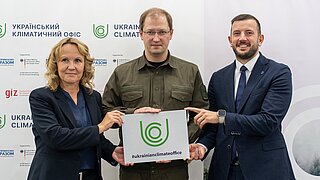
Here, the IKI is engaging with topics such as decentralisation, decarbonisation and the flexibilisation of the energy system. In 2023, three projects were launched in the field of decentralised, renewable energy for restoring energy and heat supply systems, with an overall volume of roughly EUR 40 million. The IKI also made commitments of EUR 7 million to existing projects and initiatives. What’s more, the IKI continues to work towards the implementation of energy-saving measures in the buildings sector and in relation to the pursuit of reforms of environmental, energy and climate change mitigation regulations. These efforts are being coordinated with work on the EU accession process and the adoption of the EU’s acquis communautaire (a set of rights and duties that are binding for each EU member state).
Here, the Ukrainian Climate Office, co-financed by the IKI, functions as the central point of contact for initiatives, projects, analyses and events on climate-relevant topics for Ukraine.
IKI projects contributing to the green recovery
- Developing capacities for climate policy in Southeast & Eastern Europe, South Caucasus and Central Asia
- Low Carbon Ukraine (LCU): Advising Ukrainian decision makers on low emission policy paths
- Renewable Energy Solutions Programme (“RES Programme”)
- Decentralized Renewable Energy Solutions for Social and Public Infrastructure in Ukraine
- Energy Efficiency Support Program for Ukraine – EE4U
- Reform of the District Heating Sector in Ukraine (ReWarm)
- Supporting the national energy efficiency fund and the climate-friendly reform agenda (S2I) in Ukraine
- Supporting the implementation of an emissions trading scheme in Ukraine
- BAT for Ukraine - Improving the framework conditions for the implementation of the European Directive 2010/75/EC on…
- Accelerating NDC and promoting sustainable bioenergy, agri and land-use practices in Ukraine
Beyond this, the IKI is also implementing the pilot project ‘Renewables for Resilient Ukraine (R2U)’. Find out more about R2U
Successful transformation of the energy sector in Chile

Chile offers a shining example of how to achieve real progress in a country’s transformation – a process that numerous IKI projects have been supporting for many years. Initially, efforts concentrated on chipping away at resistance to renewables while designing the regulatory framework for the energy transition. Here, IKI projects worked closely with the ministries and companies in the private sector. A detailed analysis of potential for the country as a whole, supported by the IKI, ultimately formed the basis for Chile’s energy policy.
The network operators were particularly difficult to convince. Today, thanks to the IKI projects, the national Chilean network operator utilises a powerful forecasting system for renewables that gives it optimal control of the power grid.
As a result of the IKI projects, it was possible to introduce many new ideas that established the foundation for a reorientation of the energy sector. In addition, the inherent flexibility of the projects provided space for creative work, insights and approaches. Overall, many commercial projects that pick up on and continue the IKI’s ideas and initiatives have got off the ground in Chile. The IKI projects relating to the energy transition were also influential beyond Chile’s own borders. Many regulations, methods and legal texts have been adopted directly by other Spanish-speaking countries.
Support for especially vulnerable small island states
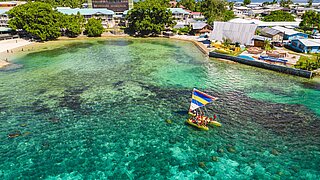
Despite all the efforts made to stem the relentless advance of climate change, its impacts can already be clearly seen in many countries. Small island developing states (SIDS) in particular are among the countries most severely affected by the impacts of climate change, although they are themselves responsible for less than 1 per cent of global greenhouse gas emissions. While island nations such as Tuvalu are ultimately threatened by complete submergence, its ecosystems and the livelihoods of its population are suffering even today.
Since 2023, an IKI project has been providing support for implementation of the Rising Nations Initiative (RNI), which was launched by Tuvalu and the Marshall Islands in September 2022. The RNI is managed by its member states and aims to advance efforts to protect the statehood of Pacific Atoll countries and preserve their sovereignty. Another focus is on safeguarding the rights and heritage of affected populations amid the climate crisis and the existential threat that this poses. The RNI is based on three areas of action: knowledge, partnerships and advocacy. The IKI project aims to ensure that the Pacific Atoll countries have suitable policy models at their disposal that allow them to maintain a properly functional state in light of the concrete threat scenario while also supporting the transition to new forms of statehood. Tuvalu has been selected as the first pilot country for the project. At the same time, efforts are being made to promote the collection of knowledge, examples and local practice, and to ensure participation by young local actors with the aim of creating a better starting-point for advocacy and for achieving support at global level.
Reducing fossil energy dependencies and urging adaptation

As a result of their often remote location, SIDS face many challenges in relation to topics such as the supply of energy and low-emission maritime shipping. Among other aspects, these include a strong dependency on fossil fuels for transport and heating, high electricity prices and energy infrastructure that is vulnerable to natural disasters.
The IKI is supporting its partner countries in their transition to sustainable and resilient energy systems, and in the decarbonisation of the shipping sector. The expansion of renewable energy and improved energy efficiency play an important role here. Supportive climate policies and finance are necessary to achieve the implementation of these goals. These aspects also form part of the IKI’s commitments in these countries.
With the Ecosystem-based Adaptation Facility (EbA Facility), the IKI has also been providing SIDS in the Caribbean with domain expertise and financial support for implementing ecosystem-based adaptation (EbA) measures and individual projects. These projects are selected by means of ideas competitions. Since 2018, a total of 34 individual projects with a funding volume of around USD 45.5 million have been selected for funding in 11 countries. To date, around 21,000 people have benefited directly from the project measures (at least 7,000 of these being women). Within the scope of the individual projects implemented, more than 11,700 hectares of adaptation-relevant coastal ecosystems were improved and/or given better protection. In 2023, the IKI topped-up its support by a further EUR 10 million with the aim of facilitating another ideas competition.
Ecosystem-based adaptation
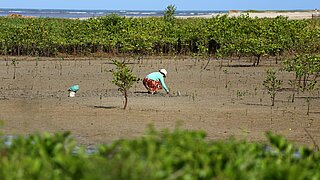
However, SIDS are not the only countries that need to adapt to the impacts of climate change. All over the world, EbA measures are an important instrument, as they are typically less expensive and more sustainable than technical solutions, which is why they form a key component within IKI funding.
Implementation of the National Adaptation Plan in Brazil
As one example, the IKI has been supporting Brazil with the ProAdapta project for implementing the country’s National Adaptation Plan (NAP). This project is strengthening the capability of key actors in infrastructure sectors, federal states and communities, in order to implement climate risk management frameworks and integrate adaptation measures, including those that follow the EbA approach.
When President Lula da Silva took office in January 2023, a far-reaching programme of government reforms began, which also affected the environment ministry. Now called the Ministry of Environment and Climate Change (MMA), it has developed a comprehensive climate plan (‘Plano Clima’) focusing on mitigation and adaptation. ProAdapta provided in-depth support to the MMA and other ministries as part of this process. At subnational level, ProAdapta has also been working successfully with the state of São Paulo and helping with adaptation planning at both a local government and state government level. In 2023, the project was extended by two years and by EUR 2 million in order to provide support to both the NAP and the NDC in relation to adaptation.
Community-based adaptation in Africa
A new start in 2023 was the implementation phase for the project CBA-SCALE Southern Africa+. This project is implementing inclusive, gender-specific and ecosystem-based measures for community-based adaptation (CBA) in more than 100 communities. These measures aim to help increase the resilience of people of all genders and social groups to climate change.
Supporting the initiative for nature-based solutions to help adapt to the impacts of climate change
In addition, the IKI is also supporting the ENACT (Enhancing Nature-based Solutions for an Accelerated Climate Transformation) initiative, which Germany launched at the 27th UN Climate Change Conference (COP27) in Egypt. This initiative has set itself the following goals:
- Protecting at least 1 billion vulnerable people, among them at least 500 million women and girls, from the impacts of climate change and strengthening their resilience
- Securing up to 2.4 billion hectares of healthy natural and sustainable agricultural ecosystems by placing 45 million hectares under conservation protection, sustainably cultivating 2 billion hectares and restoring 350 million hectares
- Significantly boosting global mitigation efforts by protecting, conserving and restoring carbon-rich land, freshwater and marine ecosystems
In 2023, the ENACT initiative received funding from the IKI-financed Global EbA Fund, which is supporting its implementation by developing a timetable, establishing an expert group and publishing the status report for nature-based solutions (NbS) in the run-up to the annual UN Climate Change Conference.
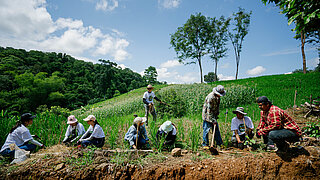
Clean and secure energy for displaced people

The impacts of the climate crisis and conflicts – which are often exacerbated by one another – are increasingly destroying livelihoods for people in many parts of the world. Some of these groups must leave their homelands to seek protection and a future elsewhere. This can result in social, political or economic challenges in the communities that take them in. The climate crisis therefore also has the potential to destabilise communities, fan the flames of conflicts over scarce resources, and compromise peace and security all over the world. Climate policy is therefore also a point of focus for German foreign and security policy.
The German Federal Government recognises the importance of taking responsibility for providing humanitarian aid to displaced people. Establishing an electrical power supply is an important precondition for humanitarian aid, but the majority of power provided in humanitarian contexts is typically supplied by diesel generators. These cause significant greenhouse gas emissions as well as costs, which are difficult to budget in advance as a result of the volatile pricing of fossil fuels. Diesel generators are also high-maintenance machines that pollute the air.
Since 2023, Germany has used an IKI project to support energy efficiency measures and sustainable energy systems – in particular decentralised, solar-powered photovoltaic systems – at United Nations project locations in humanitarian contexts. This replaces the diesel that would otherwise be required with climate-neutral solar power, thereby cutting both greenhouse gas emissions and costs. The project is concentrating initially on countries from the Sahel region as a pilot region. If the approach proves successful, the project may be expanded to include other countries and regions.
Implementing the Global Biodiversity Framework

The Kunming-Montreal Global Biodiversity Framework (GBF) comprises four long-term strategic goals and 23 targets. Following its adoption at the 15th UN Biodiversity Conference (CBD COP 15), 2023 became the year for putting the GBF into practice.
The IKI carried out many projects worldwide aimed at conserving biodiversity, thereby making significant contributions to the implementation of the GBF targets. To more clearly define the points of focus for the IKI in this context, the following three prioritised action areas were specified in the IKI’s new 2030 strategy for the funding area “Conserving biological diversity”:
- Strengthening national biodiversity strategies and action plans (NBSAPs)
- Protecting and restoring habitats
- Mainstreaming biodiversity at all levels
No less than seven of the new focal points in the 2023 thematic call are also ensuring that implementation of the GBF will remain a focus for work at the IKI in the future. These include protecting peatlands, restoring areas in sub-Saharan Africa, and resource-efficient management for climate and environmental protection in G20 emerging countries.
PANORAMA initiative as a key knowledge management tool for GBF implementation
An important component of the IKI’s contribution to implementing the GBF is the PANORAMA initiative, which the IKI has been funding since 2020. As a digital platform, it offers replicable solutions and demonstrates how protected biodiversity and well-managed ecosystems can help to overcome the challenges that communities face while increasing their resilience to the impacts of climate change. The initiative was also mentioned as a best-practice example in the final CBD-COP decision on knowledge management. In 2023, the project subsequently worked with the Secretariat for the Convention on Biological Diversity (CBD) to develop a plan for positioning PANORAMA as a key knowledge management tool for the implementation of the GBF. Initial activities were implemented via the KM4B (Knowledge Management for Biodiversity) initiative, for example, which held a series of seminars on knowledge management from September 2023 onwards.
Support for the accelerated implementation of biodiversity strategies and action plans
The NBSAP Accelerator Partnership supports the development and implementation of ambitious national biodiversity strategies and action plans (NBSAPs). The initiative also works towards the collective achievement of the goals and targets set out in the Kunming-Montreal Global Biodiversity Framework. The NBSAP Accelerator Partnership was launched at CBD COP15 under the political leadership of the Colombian government. The Accelerator aims to support country-oriented and demand-oriented partners by functioning as an intermediary and neutral broker in order to support the implementation of the Global Biodiversity Framework’s goals and targets by means of improved coordination, collaboration and shared learning. With the support of the IKI project, the NBSAP Accelerator Partnership started operations during the United Nations Environment Assembly (UNEA) in September 2023.
Restoration of forest ecosystems and forest landscapes
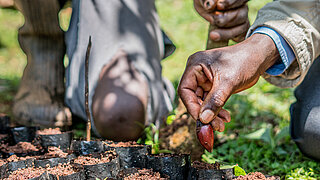
The deforestation and degradation of natural forest ecosystems creates a situation in which they can store less water and carbon while simultaneously offering less protection against erosion. Biodiversity is also reduced in these areas. The United Nations have declared this decade to be the ‘UN Decade on Ecosystem Restoration’. The restoration of forest landscapes is one of the action areas the IKI funding programme prioritises in its strategy. The IKI supports projects that are trialling innovative approaches to forest ecosystem restoration and developing measures and funding instruments to ensure the widest possible dissemination of these efforts.
Bonn Challenge Barometer opened to the private sector

With the Bonn Challenge, participating countries have agreed to restore 350 million hectares of deforested and degraded forest areas by 2030 (New York Declaration on Forests). The Restoration Barometer, which was developed with the support of the IKI, is one of the most important instruments for tracking progress in the restoration of ecosystems. In January 2023, a partnership was concluded at the World Economic Forum (WEF) in Davos between the Barometer and the WEF initiative 1t.org, with the aim of granting the private sector access to Barometer reporting.
The International Union for Conservation of Nature (IUCN) is working as an IKI implementing organisation on a partnership with the Framework for Ecosystem Restoration Monitoring (FERM) – an instrument set up by the Food and Agriculture Organization (FAO). The aim here is to work on capacity-building for reporting on Target 2 of the GBF (restoration of at least 30 percent of all degraded ecosystems worldwide) in selected countries, and to investigate possibilities for data exchange between the Restoration Barometer and FERM.
Find out more about the UN Decade on Ecosystem Restoration and the Bonn Challenge
Indian forest protection project with pilot measures covering 150,000 hectares
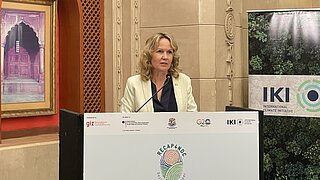
In July 2023, the G20 summit of environmental and climate ministers was held in Chennai in India. As part of this event, a new IKI project was launched as a lighthouse project.
The RECAP4NDC (‘Restore, conserve and protect forest and tree cover for NDC implementation’) project is helping India to achieve its goal of 33 percent forest coverage and the restoration of 26 million hectares of land by 2030. In four Indian states, the project is strengthening the capability of actors to effectively plan, finance, complete and monitor measures for forest and landscape restoration. In this way, RECAP4NDC is contributing to the implementation of India’s NDC, promoting biodiversity conservation, and improving livelihoods for rural communities with increased forest and tree coverage. Pilot projects covering 150,000 hectares are demonstrating tried-and-tested approaches here.
Read more about Germany’s cooperation with India on climate and the environment

I’m very happy that we are able to further advance and expand the close cooperation between Germany and India in forest conservation. India’s forests are a precious ecological resource, as a healthy forest is our natural ally in tackling the global climate crisis and species loss. A commitment to forest conservation brings many rewards and is a win-win situation, not only preserving and strengthening biodiversity but also storing carbon and retaining more groundwater. Since many people in India live from and with the forest, systematic forest conservation also creates good economic prospects – especially for local rural populations.
Sustainable land use
Environmentally compatible supply chains are a key element in sustainable land use. Establishing and protecting such supply chains requires a collective approach, however.
Reporting to Team Europe Initiatives on rainforest conservation
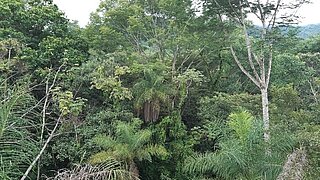
Team Europe Initiatives (TEIs) are an instrument of the European institutions that aim to improve coordination within international (development) cooperation in all sectors. To make the contributions of Germany to the EU Global Gateway Strategy and TEIs visible, all international cooperation programmes must report to Team Europe Initiatives in the future. Since 2022, this also applies to the IKI.
Accordingly, the REDD (Reducing Emissions from Deforestation and Forest Degradation) Landscape project is therefore reporting to the TEI started in December 2023 about the protection of the five major Mesoamerican rainforest systems, whose reference area is virtually identical to the project area. The TEI is supporting partner countries in their transition to sustainable, legal supply chains and boosting trade in goods with the European Union. To this end, the TEI is working with governments, smallholders and businesses with the aim of halting deforestation, conserving biodiversity and improving livelihoods for the communities living in these regions.
Find out more about the ‘TEI five great forests of Mesoamerica’
Developing private financing opportunities in Guatemala

In contrast, an IKI project dealing with the development of business models for cooperation with the private sector in Guatemala was completed at the end of 2023. Over the last eight years, this has led to the conservation of 180,000 hectares of forest in three tropical forest areas and the restoration of 900 hectares.
This is the result of farming communities working together with the private sector and policymakers to create environmentally compatible value chains. Partnerships with numerous Guatemalan companies have resulted in new financing opportunities for the conservation of biodiversity. Thanks to the involvement of high-level policymakers, the IKI implementing organisations have secured improved general policy frameworks that have benefitted both local communities and the environment.
Read more about innovative partnerships for forest restoration in Guatemala
IKI-financed Restoration Experiences Digital Forum
Co-financed by the IKI, the Global Landscapes Forum (GLF) is the world’s largest knowledge-based forum for integrated and sustainable land use. Thanks to its close links to communities, grassroots movements and local decision-makers – as well as major, multilateral donors – the GLF is in a unique position to achieve large-scale transformative change. On 21 November 2023, the GLF hosted the ‘Restoration Experiences Digital Forum: Sharing the view from the ground and connecting across landscapes’, which featured a high-level keynote given by Dr Christiane Paulus, Director-General, Nature Conservation and Sustainable Use of Natural Resources at the German Federal Environment Ministry. The digital event was based on two regional workshops held beforehand, during which African, Latin American and Caribbean IKI projects had presented their experiences with restoration measures. The digital forum was attended by 2,055 participants from 130 countries, of which 91 percent came from Africa, Asia, Latin America and the Caribbean, and reached 9.8 million people via social media, with 880,000 comments.
IKI Annual Report 2023
This article is part of the IKI Annual Report 2023. Learn more about the IKI Year 2023 ...
The link has been copied to the clipboard


